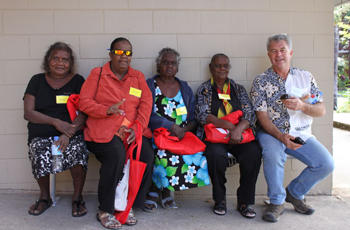ABM Archive Website
THIS WEBSITE CONTAINS ARCHIVE MATERIALS FOR HISTORICAL REFERENCE ONLY
For up-to-date information, including our latest appeals, news, and resources, please visit our current website.
ABM’s Aboriginal & Torres Strait Islander Program
 |
| Mal with community members Mrs Susan Greenwool (Kowanyama); Ms Evelyn Ambrym (Yarrabah); Mrs Yvonne Jimmy (Kowanyama) and Mrs Dorita Bounghi (Yarrabah) attending Synod. |
Dubbo, Moree, Terry Hie Hie, Cairns, Yarrabah, Townsville, Darwin, Gunbalanya (formerly Oenpelli), Redfern…. just the beginning of the places Aboriginal and Torres Strait Islander Anglican communities exist around this vast continent that I have had opportunity to visit to date.
Two key facts dominate my experiences:
1. Brothers and sisters in Christ ministering faithfully in all locations to their communities.
2. Resourcing for that ministry is a very, very challenging goal for each diocese, parish and supporting organisation like ABM.
I have been swatting up on anthropological, historical, political and mission generated descriptions of some of the situations that these two facts exist within and because of.
To summarise my insights to this point:
• statistically the factual disadvantage (particularly in fundamental areas of health, education employment and housing) that the Indigenous people of Australia have gradually (over 225 years) had to accept as their lot is a well documented and undeniable.
• politically at best we have seen innumerable attempts to address the issues only to be too quickly relegislated as one political persuasion replaces the other. At worst policies of dispossession, segregation, government control and the resulting cultural destruction have all too often undone any valuable developments.
• religiously as Noel Loos in his book White Christ, Black Cross (2007) appears to me to be saying (my paraphrasing) [… despite the objective to convert Aboriginal (and Torres Strait Islander) people into a Europeanised compliant sub-caste … the Church found itself embroiled in emerging broader social issues and changing government policies and …. as the control diminished the Aboriginal (and Torres Strait Islander) people responded more overtly and autonomously …. (and so) their present pilgrimage wherever it might lead needs the contemporary church’s support or risk being irrelevant to that journey].
As Reconciliation Coordinator I find myself visiting these inspiring people who are ministering in their incredibly challenging communities and who are struggling with the baggage that has evolved in this clash of cultures yet with the message of the Cross clearly their highest priority for their people.
To date:
• a visit to the Orana Juvenile Justice Centre in Dubbo with Rev Gloria Shipp, where in her words “most of the young men are Aboriginal”;
• a visit to the Terry Hie Hie Memorial to the Mission that existed there in the late 19th to early 20th centuries where plenty of government policy is recorded as damaging (possibly destroying) the local culture and of course its people;
• the desire and associated challenges in nearby Moree to set up a work partnering church and community organisations to support the very high rate of Aboriginal teenage pregnancy;
• the experience of meeting with parish leaders including Bishop Arthur Malcolm at Yarrabah to hear that there is (nearly invariably) insufficient money to travel to conduct a remote ministry request in this case a funeral on Palm Island;
• and the partially good news story of courses in Ministry and Theology at Wontulp Bi Buya College (also at Nungalinya in Darwin) being oversubscribed yet there being insufficient funding (government, church or mission organisation provided) to see that training meet its mark back in communities through employment of the graduates;
• and finally at the 2013 NATSIAC Gathering hearing humbling stories from all participants in ministry around the country of predominantly being resolute to address what needs to be done in communities despite being significantly under resourced.
So “from the field” I am becoming acutely aware of the challenge we as a National Church and its foundational Mission organisation (amongst others) have increasingly to address to add value to the future for the Aboriginal and Torres Strait Island ministries across the Nation in every diocese.
Reconciliation is the foundation of the Christian message. Jesus crossing all sorts of cultural boundaries in addressing the woman at the well (John 4: 1-42) continues to be for me the ultimate role model in setting goals for this role. I think, given the woman had had five husbands and possibly numerous children to different fathers, that life back at home was probably fairly chaotic. Yet she took His message of salvation back there and many became believers and I would consider serendipitously they found hope and strength therein. It is clear that much ministry (across all cultures) is within chaotic situations yet it is the message of the Cross that as made increasingly culturally relevant will provide light for the journey for those who accept the offer.
My role in being an encourager to our brothers and sisters ministering across Australia in Aboriginal and Torres Strait Islander communities will hopefully coordinate ongoing progress along the journey of reconciliation. I hope to contribute with ABM to reconciliation on one level as we aim toward the National Anglican Church having an increasing role in bridging the gap that has sorrowfully developed in Australian society over 225 years. I also believe and want to be part of ABM offering reconciliation at the higher level of the Incarnation and its ultimate hope for all people.
I urge you if you have read this far to think about ways that you in your small corner can assist in those reconciliation goals locally, in your diocese and even nationally. Let me know if you want a bit of a hand to pray, think and plan that into supportive action.
Mal MacCallum
Reconciliation Coordinator
August 2013


